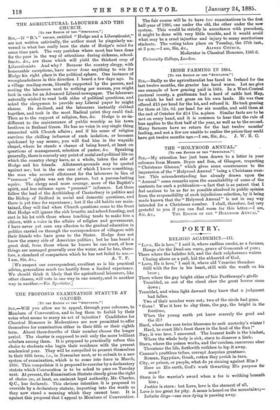THE AGRICULTURAL LABOURER AND THE CHURCH.
[To THE EDITOR OF THE "SPECTATOR:"]
SIR,—If " B.'s " verses, entitled "Hodge and a Liberationist," are not written satirically, the author must be singularly unversed in what has really been the state of Hodge's mind for some time past. The very parishes where most has been done for the poor in the way of attentions during sickness, schoolfeasts, &c., are those which will yield the thickest crop of Liberationists. And why ? Because the country clergy, with honourable exceptions, have never done anything to win for Hodge his right place in the political sphere. One instance of wrongheadedness in this direction I heard a few days ago. In a village reading-room, liberally supported by the parson, and costing the labourers next to nothing per annum, you might look in vain for an Advanced Liberal newspaper. The labourers naturally wished to read both sides of political questions, and asked the clergyman to provide any Liberal paper he might choose. He declined, and the labourers instantly clubbed together, and took in the most Radical print they could find. Then as to the support of religion, fees, &c. Hodge is as-audifferent to the maintenance of public worship as his town brethren in Bethnal Green. He has no voice in any single thing connected with Church affairs ; and if his sense of religion survives the chilling influence of such isolation, or becomes quickened by any means, you will find him in the wayside chapel, where he stands a chance of being heard, at least on questions of management, selection of pastor, &c. Speaking generally, there is scarcely any point of social and political life on which the country clergy have, as a whole, taken the side of Hodge and his friends. Allotment-grounds may be quoted against me; but in the one case of which I know something, the man who secured allotment for the labourers in lieu of " common " rights was not the parson, but a parson-baiting squire. The clergy need more courage, more of the Baptist's spirit, and less reliance upon " personal " influence. Let them follow the lead of the Archbishop of Canterbury in politics and the Bishop of Bedford in social and domestic questions, and there is yet time for repentance ; but if the old habits are maintained, they will find when Church questions come to the front that Hodge will ignore the sick bonefits and school-feasting, and cast in his lot with those whose teaching tends to make him a citizen, with a voice in the affairs of religion and government. I have never yet seen any allusion to the gradual education in politics carried on through the correspondence of villagers with their friends who have gone to the States. Hodge does not know the seamy side of American politics ; but he has heard a great deal, from those whom he knows he can trust, of how things are managed generally over the water, and he has, therefore, a standard of comparison which he has not failed to use.—
I am, Sir, &c., A. T. F. [We suspect our correspondent, excellent as is his practical advice, generalises much too hastily from a limited experience. We should think it likely that the agricultural labourers, like other classes, will vote in one way in one county, and in another way in another.—En. Spectator.]






































 Previous page
Previous page